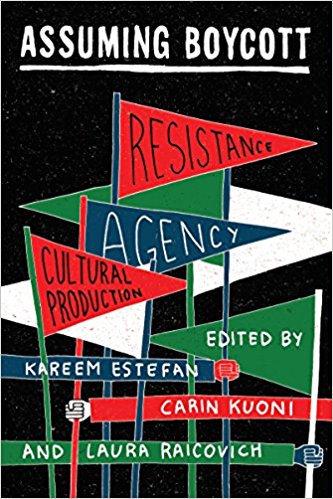
Assuming Boycott
Resistance, Agency, and Cultural Production
Estefan, Kareem; Kuoni, Carin; Raicovich, Laura. (eds.)
Date Written: 2017-05-01
Publisher: OR Books
Year Published: 2017
Pages: 276pp Price: $18 (pbk.) ISBN: 9781682190920
Resource Type: Book
Cx Number: CX20982
A collection of essays and seminars that looks at the history of boycott and divestment within activism. Examines a variety of cultural and academic boycotts around the world.
Abstract:
-
Publisher's Description:
Boycott and divestment are essential tools for activists around the globe. Today's organizers target museums, universities, corporations, and governments to curtail unethical sources of profit, discriminatory practices, or human rights violations. They leverage cultural production -- and challenge its institutional supports -- helping transform situations in the name of social justice.
The refusal to participate in an oppressive system has long been one of the most powerful weapons in the organizer's arsenal. Since the days of the 19th century Irish land wars, when Irish tenant farmers defied the actions of Captain Charles Boycott and English landlords, "boycott" has been a method that's shown its effectiveness time and again. In the 20th century, it notably played central roles in the liberation of India and South Africa and the struggle for civil rights in the U.S.: the 1955 Montgomery bus boycott is generally seen as a turning point in the movement against segregation.
Assuming Boycott is the essential reader for today’s creative leaders and cultural practitioners, including original contributions by artists, scholars, activists, critics, curators and writers who examine the historical precedent of South Africa; the current cultural boycott of Israel; freedom of speech and self-censorship; and long-distance activism. Far from withdrawal or cynicism, boycott emerges as a productive tool of creative and productive engagement.
Including essays by Nasser Abourahme, Ariella Azoulay, Tania Bruguera, Noura Erakat, Kareem Estefan, Mariam Ghani with Haig Aivazian, Nathan Gray and Ahmet Ögüt, Chelsea Haines, Sean Jacobs, Yazan Khalili, Carin Kuoni and Laura Raicovich, Svetlana Mintcheva, Naeem Mohaiemen, Hlonipha Mokoena, John Peffer, Joshua Simon, Ann Laura Stoler, Radhika Subramaniam, Eyal Weizman and Kareem Estefan, and Frank B. Wilderson III.
-
Excerpt:
From the foreword by Carin Kuoni and Laura Raicovich:
Boycott is a tool of our time, a political and cultural strategy that has rarely been more prominent than now. Examples abound of contemporary artists holding institutions accountable for the ethical standards enacted in them. By addressing labor issues in the United Arab Emirates, the funding structures and political entanglements of biennials from Sydney and Saint Petersburg to São Paulo and New York, and calls to join a cultural boycott of Israel, artists are leveraging their power to shift the ways culture is produced on individual, civic, institutional, and educational levels. Indeed, art institutions and universities, cities, and entire countries have been affected by positions that pose as "withdrawal" or "disengagement" and in fact often result in various actions and pointed engagement around specific ethical questions.
In our roles as cultural producers, we recognized implementation of boycott as a distinctly political tactic, one that generated a parallel uptick in calls for accountability in artistic endeavors. In 2014 we began planning a series of seminars and programs at the Vera List Center for Art and Politics at The New School to engage students, artists, thinkers, and general audiences in a deep consideration of the multiple trajectories of these particular contemporary conditions in which we are all implicated. Presented under the Vera List Center's curatorial focus theme Alignment, the resulting seminars and the many conversations that they spurred, as well as the culminating colloquium that took place in the spring of 2015, revealed an extensive world of ideas we felt required a publication. Fortunately, the publisher of this volume, OR Books, agreed.
This book is the result of an ongoing effort to contend with the meanings of boycott and withdrawal as significant cultural practices of our time. It focuses on key texts developed during specific campaigns as well as essays retrospectively reflecting on and synthesizing the often heated debates that accompanied particular acts of boycotts or refusal. In so doing, we hope this book not only reveals in-the-moment realities, but also tracks shifts in language and implementation of principles over the course of debate and dialogue. Above all, this gathering of texts seeks to explore how strategies, alliances, lead actors, and guidelines have responded and adapted to a changing cultural, political, and economic environment.
-
Table of Contents:
Introduction by Kareem Estefan
I. The Cultural Boycott of Apartheid South Africa
Sean Jacobs, The Legacy of the Cultural Boycott Against South Africa
John Peffer, Art, Resistance, and Community in 1980s South Africa
Hlonipha Mokoena, Kwaito: The Revolution Was Not Televised; It Announced Itself in Song
Frank B. Wilderson III, Incognegro: A Memoir of Exile and Apartheid (excerpt)
II. BDS and the Cultural Boycott of Israel
Ariella Azoulay, "We," Palestinians and Jewish Israelis: The Right Not to Be a Perpetrator
Noura Erakat, The Case for BDS and the Path to Co-Resistance
Eyal Weizman and Kareem Estefan, Extending Co-Resistance
Nasser Abourahme, Boycott, Decolonization, Return: BDS and the Limits of Political Solidarity
Joshua Simon, Neoliberal Politics, Protective Edge, and BDS
Yazan Khalili, The Utopian Conflict
III. Who Speaks? Who Is Silenced?
Tania Bruguera, The Shifting Grounds of Censorship and Freedom of Expression
Naeem Mohaiemen, The Loneliness of the Long-Distance Campaign
Svetlana Mintcheva, Structures of Power and the Ethical Limits of Speech
Ann Laura Stoler, By Colonial Design: Or, Why We Say We Don’t Know Enough
IV. Dis/engagement From Afar
Chelsea Haines, The Distant Image
Mariam Ghani with Haig Aivazian, 52 Weeks, and Engaging by Disengaging
Nathan Gray and Ahmet Ögüt, Not Walking Away: Participation and Withdrawal in the 2014 Sydney Biennial
Radhika Subramaniam, Loose Connections
Subject Headings


